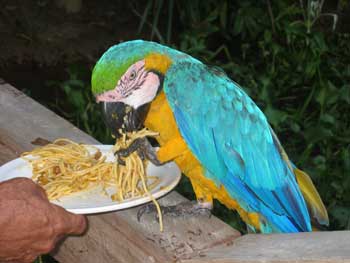Macaws have similar features to other members of the parrot family. Their large curved beaks, made of chitin, one of nature's hardest substances, will crush through a Brazil nut shell like a metal nutcracker. Their feet are equipped with zygodactyl toes—two toes facing forward and two toes facing backward, for grasping branches, climbing, picking up things, and holding food while they dine. Only birds of the parrot family use their feet in this manner, similar to the way humans use their hands. Macaws also sport long tails which they fan out to for additional lift to slow their landing and allow them to hover in midair above the branch.
To our eyes, both male and female macaws have the same outward appearance. It is impossible to tell them apart without a DNA or surgical test—unless you happen to be another macaw. Macaws are monogamous and mate for life—pet macaws will bond strongly with only one person. They typically live 40 to 100 years.
 The
diet of the macaw is mainly fruits, seeds and nuts. Wild macaws can be
found frequenting areas known as clay licks where the soil of the riverbank
or cliff is made of clay. The birds consume the clay which many believe
is an antidote to poisonous seeds or unripe fruit. The clay also has
a high concentrate of minerals which supplements the macaws' diet.
The
diet of the macaw is mainly fruits, seeds and nuts. Wild macaws can be
found frequenting areas known as clay licks where the soil of the riverbank
or cliff is made of clay. The birds consume the clay which many believe
is an antidote to poisonous seeds or unripe fruit. The clay also has
a high concentrate of minerals which supplements the macaws' diet. Most wild macaws are endangered—six species have already become extinct, due to rainforest destruction, lumbering, land development and hunters for the pet industry. Some are killed only for their colorful feathers. Although international trade is illegal under the Convention on International Trade in Endangered Species of Wild Fauna and Flora (CITES) agreement, a large number of birds are still captured for trade to Asia and 90% of these die in transport.
Click Here for information on our Costa Rica Tours.


